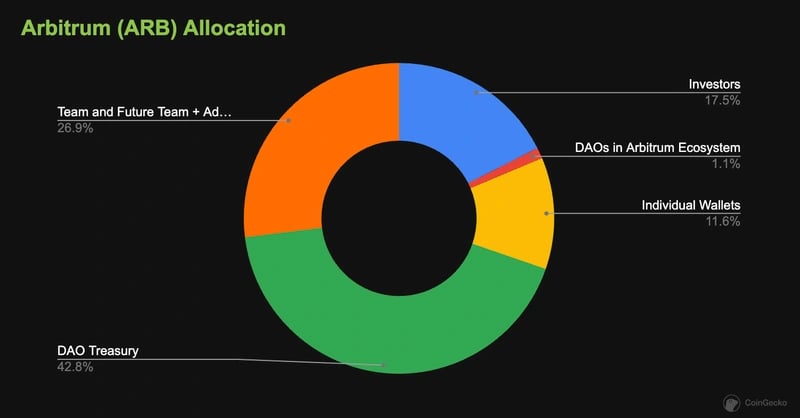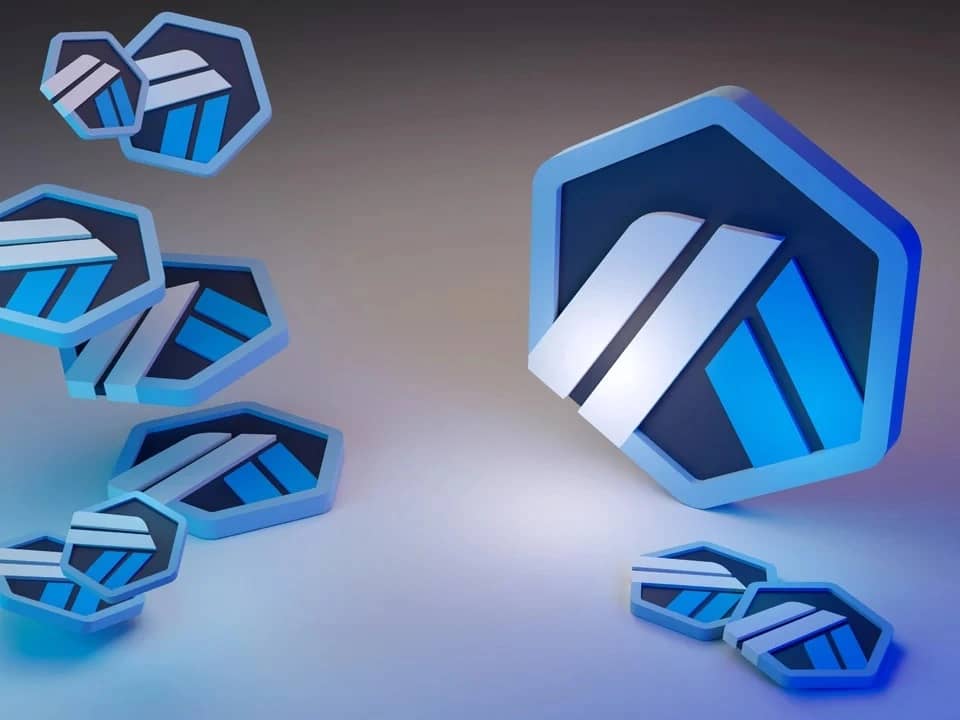위키 구독하기
Share wiki
Bookmark
Arbitrum
0%
Arbitrum
Arbitrum은 높은 처리량, 저렴한 비용의 스마트 계약을 가능하게 하면서 빠르고 안전하게 유지되는 ARB 토큰으로 구동되는 Ethereum 확장 솔루션 모음입니다. 이 플랫폼은 개발자가 수정되지 않은 Ethereum Virtual Machine(EVM) 계약 및 Ethereum 트랜잭션을 두 번째 레이어에서 쉽게 실행할 수 있도록 설계되었으며, Ethereum의 뛰어난 레이어 1 보안의 이점을 누릴 수 있습니다.[1][2] Arbitrum은 Arbitrum DAO에서 관리합니다.
2019년 1월, Arbitrum은 시드 펀딩을 통해 380만 달러를 모금했으며 시리즈 A를 통해 2천만 달러를 모금했습니다. 2021년에는 Lightspeed Venture Partners 펀드가 주도한 시리즈 B를 통해 1억 2천만 달러를 모금했습니다.[3]
2021년 5월, Off-chain Labs는 Arbitrum One의 메인넷 베타를 출시했지만 300개 이상의 dApp이 배포되고 10억 달러 이상의 TVL이 있는 개발자에게만 제공되었습니다.
2022년 6월, 8주 프로그램인 Arbitrum Odyssey가 L2 네트워크 Arbitrum One을 대중화하고 사용자를 유치하기 위해 시작되었습니다. 이는 8단계로 나뉘며 각 단계는 Arbitrum 생태계의 다양한 측면에 전념합니다.[7]
개요
Arbitrum은 완전한 Ethereum 스마트 계약 기능을 갖춘 저렴하고 빠른 트랜잭션을 위한 신뢰할 수 없는 레이어 2 프로토콜입니다. 트랜잭션 롤업 기술을 활용하여 제출된 트랜잭션 배치를 이더리움 메인 체인에 기록하고 저비용의 확장 가능한 레이어 2 사이드체인에서 실행하는 동시에 이더리움을 활용하여 정확한 결과를 보장합니다. 이 프로세스는 이더리움의 현재 계산 및 스토리지 부담을 크게 줄이면서 강력한 레이어 2 기반 DApp의 새로운 클래스를 가능하게 합니다.
Arbitrum의 목표는 개발자에게 고효율적이고 확장 가능한 이더리움 호환 스마트 계약을 시작하기 위한 사용하기 쉬운 플랫폼을 제공하는 것입니다. Arbitrum 네트워크에서는 ETH가 트랜잭션 수수료를 지불하는 데 사용됩니다. Arbitrum 네트워크로 전송하는 것은 일반적으로 이더리움으로 전송하는 것보다 90~95% 저렴하며, 수수료를 더 줄일 수 있는 상당한 여지가 있습니다.[9]
Arbitrum에는 플랫폼의 사용자 정의 가상 머신(AVM)인 가상 머신도 있습니다. Arbitrum 가상 머신(AVM)은 Arbitrum 스마트 계약을 위한 실행 영역이며 Arbitrum 체인과 상호 작용하는 스마트 계약 모음인 EthBridge를 기반으로 구축되었습니다. Ethereum과 호환되는 스마트 계약은 AVM에서 실행되도록 자동으로 변환됩니다.[8]
작동 방식
사용자가 Arbitrum 체인과 상호 작용하려면 노드 세트가 트랜잭션을 Arbitrum 시퀀서(일반적인 조건에서 사용자의 트랜잭션을 L2에 제출하는 역할을 하는 특별히 지정된 Arbitrum 전체 노드)로 전달합니다. 시퀀서는 이더리움 노드와 마찬가지로 트랜잭션 결과를 훨씬 더 빠르게 보고합니다. 그런 다음 트랜잭션은 이더리움 블록체인에 기록되어 모든 기본 데이터에 사용자가 접근할 수 있도록 합니다. 이더리움에서 트랜잭션이 최종 상태에 도달하면 최종적인 것으로 간주되어 대체하거나 재정렬할 수 없습니다. 이 시점에서 트랜잭션 결과가 완료됩니다.
트랜잭션 데이터가 이더리움 블록체인에 게시되면 트랜잭션 실행이 오프체인으로 이동하여 Arbitrum 검증자가 수행합니다. Arbitrum 검증자는 어설션(롤업 블록이라고도 함) 형태로 오프체인 처리 결과를 복구합니다. 어설션은 이더리움 체인에 낙관적으로 게시되며, 어설션에 대한 챌린지가 있는 경우에만 증거가 첨부됩니다. 검증자는 부정행위를 시도하다가 적발되면 벌금을 물게 된다는 베팅을 합니다. 이는 검증자가 부정직한 행동을 하지 않도록 장려합니다.
어설션이 게시될 때마다 모든 검증자가 챌린지할 수 있는 챌린지 기간이 열립니다. 다른 검증자는 어설션을 확인하고 잘못된 경우 사기를 증명합니다. 사기를 성공적으로 증명한 검증자는 후한 보상을 받습니다. 챌린지 기간이 성공적인 챌린지 없이 만료되면 올바른 어설션이 확인되고 이더리움에서 수락됩니다. 이는 체인을 검증하는 사람이 정직하기만 하면 Arbitrum이 사기를 방지하는 데 신뢰할 수 있도록 합니다.[12][13]
제품
Arbitrum 메인넷에는 두 개의 체인이 활성화되어 있습니다.
Arbitrum One
Arbitrum One은 이더리움을 위한 낙관적 롤업 L2 스케일링 솔루션으로, Defi 및 NFT에 맞춰 빠르고 저렴한 트랜잭션을 제공합니다. 사용자는 Alchemy, Infura, QuickNode, Moralis, ANKR, BlockVision 및 GetBlock을 사용하여 Arbitrum One과 상호 작용할 수 있습니다.
Arbitrum Nova
Arbitrum Nova는 Anytrust 확장 모델을 활용하여 게임/소셜 애플리케이션에 더 적합하도록 트랜잭션 비용을 더욱 낮춥니다. Nova는 강력한 보안을 보장하면서도 매우 저렴한 비용으로 트랜잭션을 처리하도록 최적화된 Arbitrum AnyTrust 기술을 기반으로 구축된 EVM 호환 체인입니다. Nova는 2022년 8월에 대중에게 공개되었습니다. Nova는 게임 프로젝트, 소셜 레이어 또는 낮은 트랜잭션 비용을 유지하면서 높은 처리량을 요구하는 모든 애플리케이션에 이상적입니다.
Nova는 Offchain Labs, Reddit, Google Cloud, Consensys 및 FTX를 포함하여 Web2 및 Web3에서 가장 신뢰받는 조직에서 지원합니다.[15][16]
기술
Arbitrum은 Optimistic Rollups 개념을 사용하며, 이를 통해 개발자는 변경 없이 더 낮은 전송 수수료와 증가된 대역폭으로 스마트 계약 및 탈중앙화된 이더리움 애플리케이션을 빠르게 출시할 수 있습니다. Optimistic Rollup은 트랜잭션을 롤업하는 특정 기술입니다. 속도를 높이기 위해 Optimistic Rollup은 롤업에 포함된 트랜잭션이 유효하다고 가정합니다. 이들은 업데이트된 상태를 이더리움에 게시할 때 증거를 전혀 게시하지 않고 이를 수행한다는 점에서 낙관적입니다.[14]
Arbitrum의 Optimistic Rollup은 개인 사이드체인에서 정산됩니다. Arbitrum은 트랜잭션을 일괄적으로 수집하고, 사이드체인에서 정산한 다음, 트랜잭션 데이터를 이더리움 블록체인 원장으로 다시 공급합니다.
Arbitrum 팀은 OR이 안전하고 신뢰할 수 있으며 EVM과 호환되는 L2에 대한 사용자의 현실적인 요구를 충족하는 가장 좋은 방법이라고 믿기 때문에 Arbitrum을 Optimistic Rollup(OR)으로 구축했습니다.
AnyTrust
AnyTrust는 약간의 신뢰 가정을 수용하여 비용을 낮추는 Arbitrum Nitro 기술의 변형입니다.
Arbitrum AnyTrust는 더 낮은 수수료를 위해 신뢰 가정을 도입하며, 데이터 가용성은 다음과 같은 고정된 허가된 엔터티 집합인 데이터 가용성 위원회(DAC)에서 관리합니다.
- Consensys
- FTX
- Google Cloud
- Offchain Labs
- P2P
- Quicknode
파트너
- Chainlink Labs
- Dopex
- GMX
- Hop Protocol
- Lido Finance
- Livepeer
- Quick Node
- Synapse Protocol
- Treasure DAO
- Uniswap Foundation
- Unlock Protocol
- Vesta Finance
- Coinbase Ventures
- Pantera
- Compound
- Blocknation.
팀
Arbitrum은 연구원, 엔지니어 및 Ethereum 열성 팬으로 구성된 Off-chain Labs에서 구축되었습니다. 이 팀에는 암호화, 분산 시스템 및 게임 이론에 대한 깊은 경험을 가진 개발자, 학계 및 운영자로 구성된 글로벌 커뮤니티가 포함됩니다.

- Ed Felten - 공동 창립자 + 최고 과학자
- Steven Goldfeder - 공동 창립자 + CEO
- Harry Kalodner - 공동 창립자 + CTO
- Lee Bousfield - 선임 소프트웨어 엔지니어
- Rachel Franks - 선임 소프트웨어 엔지니어
- Daniel Goldman - 선임 소프트웨어 엔지니어
- Fred Lacs - 선임 소프트웨어 엔지니어
- Mahsa Moosavi - 소프트웨어 엔지니어
- Daniel Silverberg - 운영 관리자
- A.J. Warner - 파트너십 및 전략 이사
- Hunter Brea - 커뮤니티 관리자
- Nina Rong - 커뮤니티 관리자 (중국)
- Peter Haymond - 파트너십 관리자
- Size Chad - NFT 및 게임[6]
$ARB 토큰 및 DAO 출시
2023년 3월 16일, Arbitrum 재단은 Arbitrum의 새로운 토큰인 ARB가 2023년 3월 23일에 커뮤니티 구성원에게 에어드롭될 것이라고 발표했습니다. [17]
“오늘, Arbitrum 재단은 ARB 출시와 함께 Arbitrum One 및 Arbitrum Nova 네트워크에 대한 DAO 거버넌스 출시를 발표하게 되어 매우 기쁩니다.” - 팀 트윗
Arbitrum 재단에 따르면 ARB는 Arbitrum의 공식적인 탈중앙화 자율 조직(DAO)으로의 전환을 의미하므로 ARB 보유자는 Arbitrum One 및 Arbitrum Nova를 관리하는 주요 결정에 투표할 수 있습니다. 이 네트워크를 통해 사용자는 더 빠른 속도와 낮은 수수료로 Ethereum 블록체인에서 거래할 수 있습니다. [18][19]
“Arbitrum DAO는 체인 기술 업그레이드 방법부터 체인 수익을 사용하여 생태계를 지원하는 방법에 이르기까지 핵심 프로토콜 수준에서 주요 결정을 제어할 수 있는 권한을 갖게 됩니다.” - Arbitrum 재단 성명.
$ARB
ARB는 Arbitrum의 기본 거버넌스 토큰입니다. 이 토큰은 Arbitrum 네트워크에서 거래 수수료를 지불하는 데 사용되며 프로토콜 거버넌스의 수단으로도 사용됩니다. $ARB 보유자는 프로토콜 업그레이드 또는 변경에 대한 제안 및 투표와 같은 의사 결정 프로세스에 참여할 수 있습니다.
ARB의 총 유통량은 100억 개입니다. Arbitrum 커뮤니티는 토큰의 56%를 통제합니다. 에어드랍은 총 공급량의 11.5%를 자격 있는 Arbitrum 사용자에게, 1.1%를 Arbitrum 생태계에서 운영되는 DAO에 부여합니다. 나머지 커뮤니티 토큰은 새로운 Arbitrum DAO가 통제하는 재무부로 이동하여 ARB 보유자가 자금 지출 방법에 대해 투표할 수 있습니다.

AIP-1 논란
2023년 4월 1일, 아비트럼 재단에 거의 10억 달러에 달하는 7억 5천만 ARB 토큰의 통제권을 부여하는 제안이 아비트럼 블록체인 DAO의 토큰 보유자들 사이에서 논쟁을 촉발했습니다. 이 제안은 일부 사람들에게 지나치게 광범위하게 보였고 재단이 자금에 대해 갖게 될 통제력의 양에 대한 우려를 제기했습니다. [22]
이 제안은 특별 보조금, 서비스 제공업체에 대한 상환, 관리 및 운영 비용을 위해 ARB를 관리 예산 지갑으로 이전하는 것을 목표로 했습니다. 주말 동안 아비트럼 커뮤니티 구성원들은 투표가 이미 내려진 결정을 비준하기 위한 것임을 발견했습니다.[23]
- 거의 7억 5천만 ARB(8억 8,500만 달러)가 토큰 보유자의 승인 없이 이미 별도의 재무부로 옮겨졌습니다.
- 재단에 따르면 4천만 ARB(4,720만 달러)가 "금융 시장의 정교한 행위자"에게 대출로 할당되었습니다.
- 1천만 ARB(1,180만 달러)가 운영 비용을 위해 법정 화폐로 전환되었습니다. [21][22]
Blockworks Research는 또한 AIP(Arbitrum Improvement Proposal) 프레임워크에 반대하여 다음과 같이 말했습니다.
"우리의 핵심 관심사는 알 수 없는 지갑 서명자가 있는 Arbitrum Foundation의 통제하에 있는 것으로 보이는 7억 5천만 ARB 토큰에 있습니다. 너무 자주 자금이 지출의 블랙박스로 들어가는 것을 보았습니다. 이제 DAO 투명성을 우선시해야 할 때입니다."
Arbitrum 재단의 대응
2023년 4월 2일, Arbitrum 재단은 첫 번째 거버넌스 제안인 AIP-1이 "통과되지 않을 가능성이 높다"고 트윗하며 논란에 대응했고, "커뮤니티로부터 받은 피드백을 해결하기 위해 노력하고 있다"고 덧붙였습니다.
Arbitrum은 DAO의 조언에 따라 AIP를 여러 부분으로 나누어 커뮤니티 구성원들이 다양한 하위 섹션에 투표할 수 있도록 결정했습니다.
"AIP-1은 너무 크고 너무 많은 주제를 다루고 있습니다. DAO의 조언에 따라 AIP를 여러 부분으로 나눌 것입니다. 이를 통해 커뮤니티는 다양한 하위 섹션에 대해 논의하고 투표할 수 있습니다."[20]
또한 7억 5천만 ARB를 보내는 결정은 별도의 AIP에서 투표될 것이며, 팀은 4년의 베스팅 기간과 같은 더 많은 책임성을 추가하기 위한 옵션을 연구하고 있다고 덧붙였습니다. 또한 팀은 특별 보조금 프로그램을 **"생태계 개발 펀드"**로 이름을 변경하고 자금이 어떻게 사용될지에 대한 더 자세한 정보를 추가할 것이라고 밝혔습니다.
Arbitrum은 제안을 더 잘 전달했어야 했다는 점을 인정하고 토큰 일부를 스테이블 코인으로 전환했음을 확인했습니다. [21]
"재단은 토큰을 판매하기 위해 존재하는 것이 아니며, 현재 운영 비용을 충당하기에 충분한 양만 판매했으며, 단기적으로 더 많은 토큰을 판매할 계획은 없습니다."라고 Arbitrum은 밝혔습니다.
Arbitrum 재단은 또한 커뮤니티의 동의 없이 "운영 목적"으로 수백만 달러 상당의 ARB를 판매한 것에 대한 반발에 대해 "단기적으로 더 많은 토큰을 판매할 계획이 없다"고 약속했습니다. [24]
Arbitrum 새로운 거버넌스 제안
2023년 4월 5일, Arbitrum 재단은 첫 번째 거버넌스 시도 실패 후 발생한 논란에 따라 새로운 개선 제안(AIP) 초안을 발표했습니다.
“재단은 DAO에서 허용 가능한 예산 및 스마트 계약 잠금 일정을 승인할 때까지 관리 예산 지갑에 남아있는 7억 개의 토큰을 이동하지 않습니다.” [26]
제안에는 스마트 계약 잠금 일정, 지출, 예산 및 투명성을 다루는 AIP-1.1이 포함됩니다. 다른 하나인 AIP-1.2는 현재 창립 문서에 대한 수정 사항을 다루고 “거버넌스에 대한 접근성을 높이기 위해” 제안 임계값을 5백만 Arbitrum(ARB) 토큰에서 1백만 ARB로 낮춥니다.
재단은 또한 “DAO를 가동하기 위해 취해진 조치를 설명하는” 투명성 보고서를 발표했습니다. [27]
"피드백을 듣고 이를 해결하고 재단이 그들의 지원으로 DAO의 최선의 이익을 대표하고 봉사할 수 있도록 부지런히 노력했습니다.
두 개의 새로운 AIP는 Arbitrum 커뮤니티 포럼에 게시되었으며 계획된 1주일 스냅샷 투표 전에 최소 72시간 동안 피드백을 받을 수 있도록 했습니다. [25][26]
잘못된 내용이 있나요?
